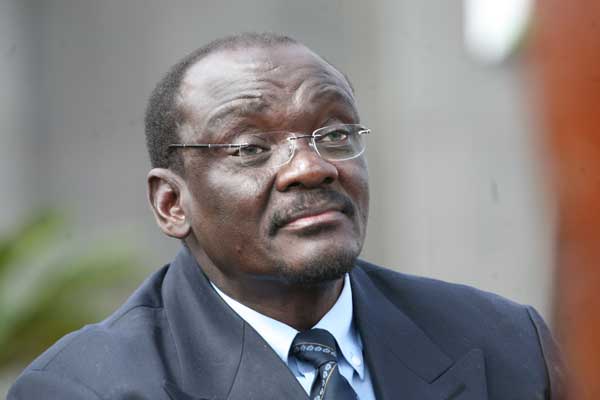
By Rex Mphisa
VICE-President Kembo Mohadi yesterday announced a raft of government drought relief strategies, among them massive mobilisation of grain and an immediate livestock restocking exercise.
Mohadi said a high-powered committee was now in place to procure grain from the world over, making an undertaking that not a single Zimbabwean should starve. For the first time the government would import genetically modified grain, he said.
Severe food shortages loom in Lowveld areas of Zimbabwe, in particular Matabeleland South where thousands of Zimbabweans are living on less than 50 cents a day as one of the worst droughts in living memory is feared.
Mohadi said government would shelve other projects to concentrate on feeding the nation.
“As government we will do everything within our power to ensure that no one starves. This means we will go out of our way; we will forego certain projects to feed the nation,” Mohadi said.
He was addressing hundreds of mourners at his homestead during the burial of his nephew Admire Mbedzi (34) who died on Wednesday after a long illness.
Mohadi said several other agencies would partner government in drought mitigation with the state taking a front role.
- Chamisa under fire over US$120K donation
- Mavhunga puts DeMbare into Chibuku quarterfinals
- Pension funds bet on Cabora Bassa oilfields
- Councils defy govt fire tender directive
Keep Reading
“Have faith, do not feel hopeless because we are even going to have concessionary laws to see how we can rebuild our national herd, which programme will start now,” said Mohadi, who himself has lost more than 200 cattle to the current drought.
“We have to have a way forward. Cattle have died, the drought is here. It is dry and most people believe we will remain with nothing, but it will not be so even though I believe this drought is worse than last year.”
He asked district coordinators (formerly district administrators) and ward councillors to keep their provincial ministers up to date with statistics of affected communities for speedy relief reactions.
He said maize imports would be from as far afield as Mexico and other South American countries complemented by other imports from the region.
Turning to the nagging price increases of basic commodities, Mohadi said government made a deliberate decision not to increase money on the market to curb inflationary reactions.
“I do not want to delve into mathematics, but believe me our rates are cheaper when in comparison with the region. That is why we are losing our fuel to neighbouring countries because ours is cheaper at the equivalent of US$0.83 per litre compared to SA’s US$1.01,” he said.
Domestic consumption of fuel has risen to about four from two to three million litres a day from one and a half million as people from other countries descend into the country to get cheap fuel.
“Yes, goods are expensive in the sense that we don’t have enough bond notes in circulation, but when we look at the rates, our goods are still cheaper compared to other countries in the region,” Mohadi said to a silent crowd.
He said prices of goods were expected to stabilise in the first quarter of the year as government would continue with steady release of money into the market.
Turning to his departed nephew, Mohadi, who in the last 12 months has lost more than eight very close relatives, appealed for unity.
Mbedzi, who was a shipping agent, was a son of Vice-President Mohadi’s sister Catherine.
He was buried at the Mohadi family homestead at Mtetengwe and is survived by his wife and three children.










